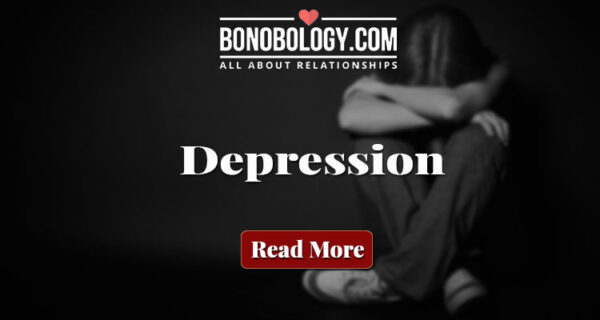We’re addressing the facets of severe depression post-breakup with the guidance of psychotherapist Dr. Aman Bhonsle (Ph.D., PGDTA), who specializes in relationship counseling and Rational Emotive Behavior Therapy. From post-breakup syndrome meaning and symptoms to its timeline and coping strategies – this comprehensive guide has it all. If you’re looking to get a better understanding of your situation, you’re in the right place.
What Is Post-Breakup Syndrome?
A relationship is one of the most beautiful experiences of our life. It comprises a memorable past, a loving present, and a hopeful future. Naturally, the end of such a connection stops us dead in our tracks and makes us lose all sense of direction and purpose. The loneliness after a breakup is truly one of a kind – heartbreak brings the best of us down to our knees. But why does post-breakup depression hit us so hard? Dr. Bhonsle explains, “A breakup becomes the cause of immense grief for both partners involved. They have envisioned a future for themselves and separation brings an end to all their designs. When people don’t get what they wanted out of the relationship, they struggle with the loss of a dream. It is also important to recognize that a partner slips into many roles (friend, traveler, adventurer, companion, etc.) and hence, a relationship virtually affects every sphere of a person’s life. “The enormity of change brought about by a breakup can get overwhelming. A person loses a lot of things and recalibrating is extremely challenging.” The amount of stress people undergo during a breakup increases their probability of developing depression. In fact, a 2019 study revealed that post-breakup states resemble symptoms of clinical depression. To answer your question (although there can be no straightforward answer), post-breakup syndrome is the emotionally distressing period that follows the end of a relationship. It is characterized by pessimism, grief, and lethargy besides a host of other signs. While everyone goes through post-breakup syndrome, some people take breakups harder than others. They slip into depression because of prolonged sadness and are unable to move on or process the separation. It is time to address what severe depression post-breakup looks like.
What Are The Symptoms Of Post Breakup Depression?
Depression caused by the end of a romantic relationship is harrowing to live with. It causes intense discomfort and pain on emotional and physical fronts. But in order to tackle it in the right manner, you have to identify its symptoms. No individual should self-diagnose from a psychological point of view. They can, however, spot the warning signs and seek professional help to come out of depression after a breakup. Take a look at these post-breakup depression symptoms and conduct an objective analysis of your condition. Be honest with yourself for it is the first step toward recovery. Cast away denial and recall the wise words of C.S. Lewis from The Problem of Pain –“Mental pain is less dramatic than physical pain, but it is more common and also more hard to bear. The frequent attempt to conceal mental pain increases the burden: it is easier to say, ‘My tooth is aching’ than to say, ‘My heart is broken.’”
1. Changes in weight
Dr. Bhonsle says, “A sharp increase or decrease in weight is indicative of a problem at hand. Many people gain/lose their appetite after a breakup and stop taking care of their bodies. This is the most obvious tell-tale of the onset of depression.” Well, have you been eating healthy and drinking enough water? Or are you stuck in the loop of binge-eating or starvation? Depriving your body of nutrition is one of the worst post-breakup depression symptoms.
2. Addiction or substance abuse
Many people seek solace in drinking and substances after the end of a relationship. They teeter on the brink of addiction and put their health at risk. Drunk dialing an ex is often laughed off but it suggests something far more serious. Think about your recent drinking history – how often have you drowned your sorrows in a glass of whisky? If you’re undergoing post-breakup depression, the answer will take you by surprise.
3. Severe depression post-breakup leads to isolation
Dr. Bhonsle explains, “People exhibiting depressive symptoms abandon all company. They stay away from family, friends, and coworkers; being by themselves increases the intensity and frequency of negative thoughts. The absence of a social life essentially means there is no support system.” Chances are, you’ve got a lot of missed calls and unopened messages on your phone. Don’t feel like returning those, right?
4. Loss of motivation
This is yet another important sign to watch out for. Dr. Bhonsle says, “Individuals lose their drive and become lethargic and unmotivated. They accomplish everyday tasks with great effort or struggle.” Something as regular as grocery shopping can seem burdensome if you are experiencing post-breakup depression. A similar symptom is a disinterest in activities you usually find pleasurable. You’ll find yourself using the phrase, “I don’t feel like doing it” often.
5. Poor sleep schedules are post-breakup depression symptoms
There are two ways this can go – insomnia or excessive sleeping. Insomnia is a sleeping disorder that doesn’t permit one to fall asleep or makes them wake up at odd hours. The sleep is unrestful and disturbed, birthing many other problems like irritability, poor digestion, breakouts, etc. On the other hand, depression can also cause excessive sleeping (11-13 hours in a day) at odd times. Both ends of the spectrum are harmful to your system.
6. Negative trains of thought
The final sign is intrusive and negative thinking. This includes self-hatred, suicidal ideation, compulsive thoughts about the relationship, and what-if scenarios. The mind becomes a chaotic and unpleasant space; you cannot function optimally when you’re distracted and overthinking. Dealing with these trains of thought is essential because they can translate into action very quickly. But before we speak of how to come out of depression after breakup, we must answer a very important question. It has occupied everybody’s mind at some point in time – there is no scientific answer to it really. Let’s see if we can resolve your quandary by answering how long post-breakup depression lasts.
How Long Does It Take To Feel Normal After A Breakup?
There are no fixed pathways to healing. No matter how badly you want it, you will not find a fixed answer to this question. Nobody can give you an exact date or time period for the expiry of your post-breakup depression. That’s a journey you embark on by yourself – nobody can give you an itinerary for it. Dr. Bhonsle explains, “It’s completely subjective. Some people take a few weeks to emerge from a bad breakup while others take two years. It depends on them and their emotional abilities to process the event. It’s very hard to give someone an approximation. But no one should try to speed things up – take your time and be patient with your progress. It’s not a competition you have to win and comparing trajectories with others doesn’t work.” Moreover, healing is not linear. One step forward does not guarantee that you won’t take two steps back tomorrow. Dealing with post-breakup depression is messy and chaotic. It involves a lot of back and forth where one great day preceded several bad ones. But here’s what we can tell you in the affirmative: it gets better. While it feels like the end of the world (and it probably is for you), getting over the love of your life is possible. With consistent work and a whole lot of patience, you can come out of depression after breakup. This leads us to our next segment which focuses on recovery. You’ve got a fair idea of what you’re going through; let’s learn how to tackle it.
How To Deal With Post-Breakup Depression
You can’t ‘cure’ post-breakup depression in the conventional sense. Equating it to a physical illness will not help your case. But if there’s no vaccine for this ailment, how to deal with post-breakup depression? We have listed 3 broad pointers that can help you navigate the blues better. Use them as a jumping-off point and choose a method of recovery that best works for you. We urge you to consider all the options fairly; don’t dismiss any suggestion instantly. You never know what might strike a chord. Steer clear of presumptions and read on with an open mind. Here’s presenting the top 3 ways of handling post-breakup depression effectively…
1. Seek professional help
Post-breakup depression can take a huge toll on your emotional and physical health. When you are running low on resources, reaching out to a mental health professional is advisable. Dr. Bhonsle says, “A therapist or a counselor can help you see things from a wider perspective. They can help you realize that grief is a universal human emotion. That this is not an experience unique to you. “Others have walked this road before you and emerged on the other end. This knowledge can be comforting in the face of pain and heartbreak. That you are not alone in your suffering and loss.” At Bonobology, we offer professional help through our panel of licensed experts. They can guide you through the pain of your breakup and the process of recovery.
2. How to deal with post-breakup depression? Self-care and self-love
Take a shower, clean the apartment, and stop eating junk food. It’s time to get it together, right? Establishing a routine goes a long way in coping with severe depression post-breakup. Go to work and sleep on time. Exercise, please! You have to start getting back to some semblance of normalcy. Wallowing in misery is just not sustainable. Besides self-care, learn how to love yourself all over again. Practice mindfulness, yoga, meditation or journaling to make peace with the past and gain clarity on the present. Don’t throw yourself in a cycle of one-night-stands or flings. Enjoy your own company for the time being and spend quality me-time. There are many advantages of singledom – use them to the fullest.
3. Support systems are a must
One-man-armies are great. But they are also temporary. If you want to truly cure post-breakup depression in the holistic sense, rely on your friends and family. Let them help you out with the cleaning or repairs and accept their invitations for dinner or drinks. Surround yourself with loved ones who remind you that life is beautiful. You have other meaningful connections besides your ex, so cherish them. Dr. Bhonsle gives a helpful tip, “I’ve always found that the experiences or stories of others can be a great help. Read/watch/listen to people who have dealt with heartbreak. How did they get through it? What were the mistakes they made (which you can consequently avoid)? You can borrow from their knowledge if you approach things with a growth mindset.” Truly wonderful, isn’t it? And just like that, we’ve covered all our bases. You now know how to deal with post-breakup depression stably and maturely. If we’ve missed something here, please let us know in the comments below. We’re always glad to hear from you. Good luck on your journey – we’re rooting for you.


